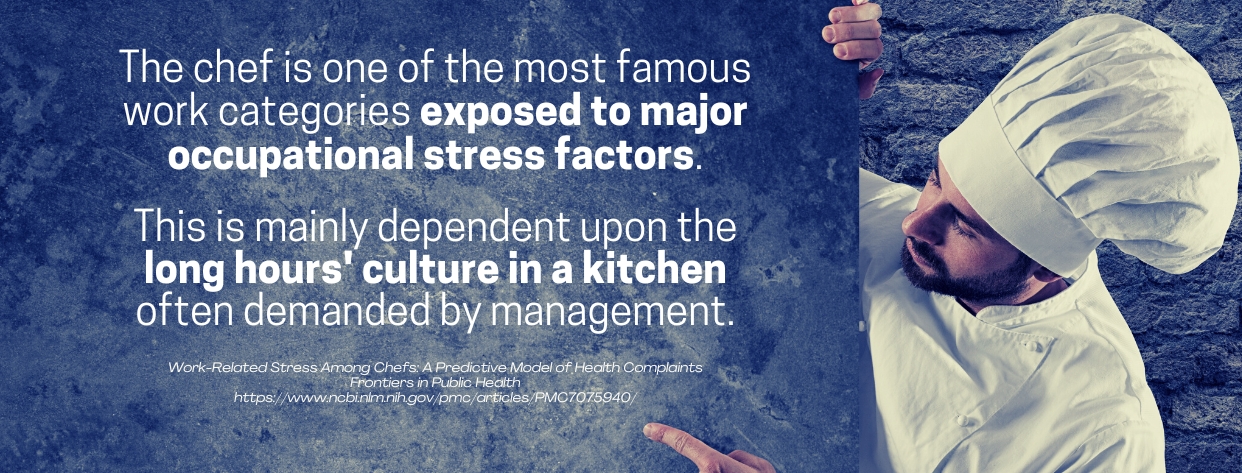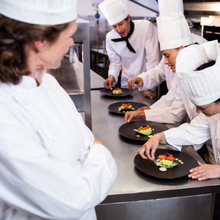Find Your Perfect School
Being a chef is a very rewarding profession. You will be praised for the scrumptious and mouth-watering dishes you create. You can also get awards if you join cooking competitions. On top of that, chef jobs get you free rein to decide on and prepare the food to serve the guests, allowing you to showcase your creativity and skills.
If you want to travel the world, being a chef is one of the easiest ways to do it, too! You can be a chef on a cruise ship, yacht, or franchised restaurant, allowing you to travel to different locations. A culinary profession also means exposing you to different cultures and using what you learn to inspire different meals. Moreover, you’ll have plenty of opportunities to meet new people, allowing you to widen your network.
However, there are two sides to a story.
A chef’s job can also be very demanding. In preparing meals, they can be under a lot of pressure. Working in a world-renowned restaurant where dignitaries and famous personalities dine can result in burnt-out cooks who work long hours, especially in a short-staffed restaurant kitchen. Even personal chefs or private chefs in charge of planning meals for individuals may also consider changing careers due to unhealthy work environments, too.
Additional Information:
- The Top Outstanding Culinary Schools in America
- The Best Scholarships For Culinary School
- What are the best Culinary Schools in America?

Chefs Change Careers: Hacks for Taking that Leap
Are you still on the fence, waiting for that opportunity to change career paths? If you want to take your culinary expertise somewhere, here are some tips:
- Carefully navigate your career change ideas and options.
- Evaluate your skills as a chef that could be transferable to alternative careers. These can include skills like management, marketing, budgeting, communication, and customer service.
- Update your professional profile to reflect your new career goals.
- Contact people and groups in your desired career path, and ask about job openings. This means joining professional associations where many chefs could be on the same page as you. It also entails attending industry events.
- Volunteer or work part-time to gain experience in your new position. You’ll be able to continue to develop your knowledge and skills by being patient and persistent.
Top Options for Career Changes for Chefs
Leaving your job as a chef can be a difficult decision to make. Check out 15 other career paths you can consider if you want to leave your culinary profession.
Chef Instructor
A chef instructor is responsible for teaching culinary skills, techniques, and knowledge to students who want to become professional chefs. They may develop lesson plans, demonstrate cooking methods, provide feedback on student performance, and oversee kitchen operations. Additionally, they may evaluate and update curriculum, maintain equipment and supplies, and stay current with food service industry trends and standards.
Teaching cooking classes is a rewarding career path. For one, you can share your knowledge and passion with your students. You’ll be able to impart your expertise and love for cooking to aspiring chefs, and it can be a fulfilling experience to see their students succeed. A head chef is an ideal teacher who will impart knowledge to aspiring professionals in the kitchen.
Research and Development Chef
Your chef experience makes you a great candidate for the research and development (R&D) chef role, wherein one of your main jobs involves recipe development. As an R&D chef, you’ll also be responsible for developing innovative products for food manufacturers, restaurants, and other food-related businesses. Your primary goal is to create unique and delectable food products that will satisfy your customers’ tastes and preferences while also meeting business needs, such as cost, scalability, and nutritional requirements.
An R&D chef typically works with other food scientists and product development professionals to come up with new food concepts, apply research feedback to improve existing recipes, and test new products in the lab and the field. They may also be responsible for managing the kitchen staff, sourcing ingredients, and ensuring that all products meet strict quality and safety standards. Moreover, you’ll get to travel and attend events like tradeshows, conferences, and seminars about food science and production.
Cafeteria Manager
Some of the primary responsibilities of a cafeteria manager are to oversee the daily operations of a cafeteria or food service establishment, ensuring that food is prepared and served safely, efficiently, and with high quality. You’ll also be tasked to manage staff, order and track inventory, set prices, create menus, and ensure all sanitation and safety protocols are met.
A cafeteria manager also handles customer service and addresses any issues that may arise while working to improve and expand the business. You can also be in charge of creating and maintaining budgets and financial reports, as well as managing food costs and revenue.
Food Stylist
As a food stylist, you’ll be in charge of arranging and styling food that will be used for filming and photography. Food styling means working closely with photographers, videographers, chefs, and other members of the production crew to ensure visually appealing and appetizing images or clips of food for magazines, cookbooks, commercials, advertisements, and other media.
Food stylists must have knowledge of the latest food trends, presentation styles, and cooking techniques. After all, they are responsible for choosing the ingredients, preparing the food, and styling it to make it more attention-grabbing on camera.
Culinary Nutritionist
A culinary nutritionist is someone who specializes in the intersection of nutrition science and culinary arts. They work with chefs, restaurants, and food companies to create healthy and delicious meals and recipes that meet specific dietary requirements. They may also educate individuals on preparing nutritious meals and healthy eating. The focus of their work is to promote good health through the use of nutritious and delicious food.
If you’re passionate about both food and health, then you should consider shifting to being a culinary nutritionist. This role also requires you to have a strong desire to learn about the health benefits of various foods and the ways to prepare them to maximize those benefits. Being a culinary nutritionist is definitely a rewarding job because you’ll get to work in various settings, including hospitals and schools. You’ll also continuously learn about nutrition to ensure you’ll always be on top of the latest trends, discoveries, and developments in the field.
Food Scientist
A food scientist specializes in studying food, including its chemical, nutritional, and physical properties and the way it is preserved and processed. You will get to work in various industries, including food production, research, and agriculture, to innovate and improve food products, ensure the safety and quality of food, and develop state-of-the-art techniques for preserving and processing food. Your knowledge and experience in the culinary industry will help solve various challenges in the food industry.
Food Sales Representative
Your work as a food sales representative involves promoting and selling company goods, particularly food items, to potential customers, including grocery stores, diners, restaurants, and food service providers. You may work for a food manufacturing or distributing firm. You will be responsible for maintaining customer relations, providing product demonstrations, monitoring sales performance, and attending tradeshows. More importantly, you must generate sales and increase your company products’ market share.
Food Writer
If you’re a chef with a knack for stringing words to create engaging and informative content for an audience, you can switch to being a food writer.
As a food writer, you’ll write about food and related topics, such as cooking, recipes, restaurants, and culinary culture. Your work can then be published in various media, such as books, newspapers, magazines, blogs, and social media. Food writers may also be involved in food criticism, recipe development, and food-related event planning.
Working as a food writer opens up many travel opportunities for you. You may travel to other countries to explore their local dishes, cooking techniques, and traditions and write about them. You’ll also get to interact with other people and hear food-related stories. You can also work for magazines, websites, and other media outlets.
Food Influencer
As a chef, you obviously have a passion for food. You can use this drive to switch to being a food influencer, wherein you can share your love for everything delicious with your followers. As a food influencer, you can creatively experiment with new recipes, food photography, and styling. Use various social media platforms to share your content and inspire and educate other people about various kinds of food, cooking techniques, and cultures.
Once you’ve built a following on social media, you can then monetize your content through sponsorships, partnerships, and collaborations.
Restaurant Consultant or Manager
Being a restaurant consultant, you’ll work to provide expert advice and guidance to restaurant owners and managers to improve their restaurant’s overall performance. The consultant may help with menu planning, staff training, marketing strategies, financial management, and other operational issues. Your role also involves providing valuable insights and solutions to the challenges faced by the restaurant, helping to increase its revenue, efficiency, and customer satisfaction.
Caterer
Caterers are food and drink service providers for events, gatherings, or parties. Experts in the catering industry will prepare and serve food for weddings, corporate events, conferences, parties, and other social gatherings. They also handle the setup, cleanup, and decoration of the event space, as well as provide the equipment needed for the event.
With stellar customer service skills, caterers work closely with clients to customize the services and meet their specific needs and preferences.
Health Inspector
A health inspector is one who is in charge of ensuring that food establishments, public buildings, and other public spaces are safe and healthy for human use. They inspect and evaluate various facilities, including restaurants, cafes, hotels, and other public spaces, to make sure they comply with health and safety regulations.
Primarily, health inspectors examine food preparation areas, equipment, and storage facilities to ensure they meet sanitation standards or health and safety codes. They also check for pests and other potential health hazards. In addition, a health inspector may educate employees on proper food handling and hygiene practices, investigate health-related complaints, and issue citations and penalties for violations of health and safety regulations.
Hospitality Manager
A hospitality manager is responsible for overseeing and managing various aspects of the hospitality industry, including restaurants, hotels, resorts, and other types of accommodations. Their primary responsibilities may include managing operations, hiring and training kitchen staff, budgeting and finance, marketing and promotions, maintenance and safety, and strategy planning. In other words, you will be in charge of making sure that hotels, resorts, restaurants, and other hospitality businesses are operating optimally.
Kitchen Designer
As a kitchen designer, you will work with clients in designing, planning, and overseeing the construction of kitchen spaces. You will work with clients to discuss their specific needs and preferences, including assessing the shape and size of the kitchen, identifying the client’s unique style, and understanding the purpose of the space.
Based on the consultation, you will then create a detailed design plan for the kitchen, including the layout of the fixtures, appliances, and cabinets. You will also furnish 3D models and renderings of the space so your clients can visualize your design. Aside from that, you will also be involved in selecting the materials and overall management of the project.
Food Safety Specialist
Your duties as a food safety specialist include monitoring the production and processing of food, implementing and enforcing food safety regulations and standards, conducting inspections and audits, training employees on food safety, and investigating and responding to foodborne illness outbreaks. On top of that, you will be in charge of identifying potential hazards and implementing preventative measures to minimize risks to the public.
In Conclusion
Transitioning to a new career path can be quite nerve-wracking. Of course, treading unfamiliar waters can be quite daunting. The uncertainty that comes with a career change is not to be taken lightly either!
The trick is to re-evaluate your skills and where they can take you, AND take all the time you need to assess your options carefully! With the right attitude and a positive mindset that truly banks on your chef career skills, you’ll find success in your new role, whether as a food preparation business owner, food safety specialist, restaurant manager, or chef instructor!







